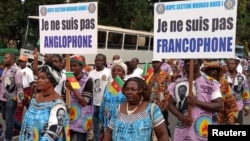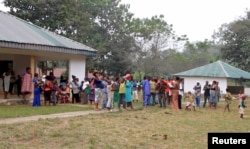Cameroon Christian and Muslim religious leaders are calling for peace and talks to end the crisis in English-speaking regions of the central African nation that has prompted secession calls.
The religious leaders say the crisis could add to the bloodshed from the Boko Haram insurgency in the north and the crisis in neighboring Central African Republic.
At Yaounde's Catholic cathedral, the Saint Anne choir sang for peace in Cameroon at an ecumenical service attended by all Christian denominations and Muslims. Among the hundreds of priests, pastors and imams is Chieck Mohamadou Muktar of the Etoudi central mosque in the Cameroonian capital.
"Every one of us must apply the command of the almighty God to live in peace, in harmony with the other people everywhere we are, and we must be all of us, without any distinction, ambassadors of peace," Muktar said.
Apostle Paul Keng of the Living Word fellowship, who spoke for Pentecostal denominations, said his greatest wish is for peace to return to Cameroon in 2018.
"All Cameroonians, come together on the table and let peace be on our nation, because nobody can develop a nation when there is war,” Keng said. “I am calling on our leaders that are in the position of influence to open their hearts to the Lord. Cameroon has a great destiny. Please come to the Lord, and God is more than able to do it. He is going to heal our land, so peace in Cameroon in Jesus' name."
Cameroon’s challenges
Cameroon has experienced few major challenges since its independence in the 1960s. But in the past several years, it has been enveloped by a bloody Boko Haram insurgency in the north, the spillover of the violence in the Central African Republic, and calls for secession in its English-speaking southern regions.
In the English-speaking southwestern towns of Eyumojock and Mamfe, attacks on military positions escalate by the day.
Alain Mukete, a 36-year-old resident of Eyumojock, says he supports the secessionists. He says he preferred to speak in French, so authorities in Yaounde would get the message that English speakers in the country, where French is also an official language, want their independence because they can no longer bear mistreatment by the French majority.
He says even if they are arrested, they will press for their independence. As a sign of dissatisfaction with the injustices they have suffered, he said, they have decided not to send their children to school. He says they have decided they must separate from French-speaking Cameroon, and when they have their independence they will reorganize their own school year and start over again.
Schools have been closed in most of English-speaking Cameroon for more than a year.
Separatists
In early October, the separatists declared the independence of a state they call "Ambazonia" and claimed Julius Ayuk Tabe, an information technology executive with the American University of Nigeria, was their president. Cameroon says many separatist fighters were going for training in Nigeria.
So far, the separatist fighters have killed at least 12 soldiers and policemen in the two English-speaking regions, according to the government. Residents and local newspapers say at least 20 soldiers have been killed. Dozens of the separatists have also been killed, and at least 40 suspects arrested.
Cameroon President Paul Biya declared war on the fighters, calling them terrorists.
UN prepares
Last November, the UN High Commissioner for Refugees said it was working with the Nigerian government and other U.N. agencies on a contingency plan for humanitarian assistance to thousands of Cameroonians crossing into Nigeria as a result of tensions and fighting between armed separatists and government troops.
Nigeria and Cameroon are in a war with Boko Haram that has created one of the world's worst humanitarian crises, with about 25,000 people killed and about 2.5 million displaced. Cameroon is also grappling with the crisis in neighboring CAR that has led to sporadic attacks on its territory by armed groups for supplies.
The clergy are calling for honest and sincere dialogue between the government and the separatists to stop what they say may be genocide in the making, but Biya has maintained that he is not open for negotiation with the separatists.





